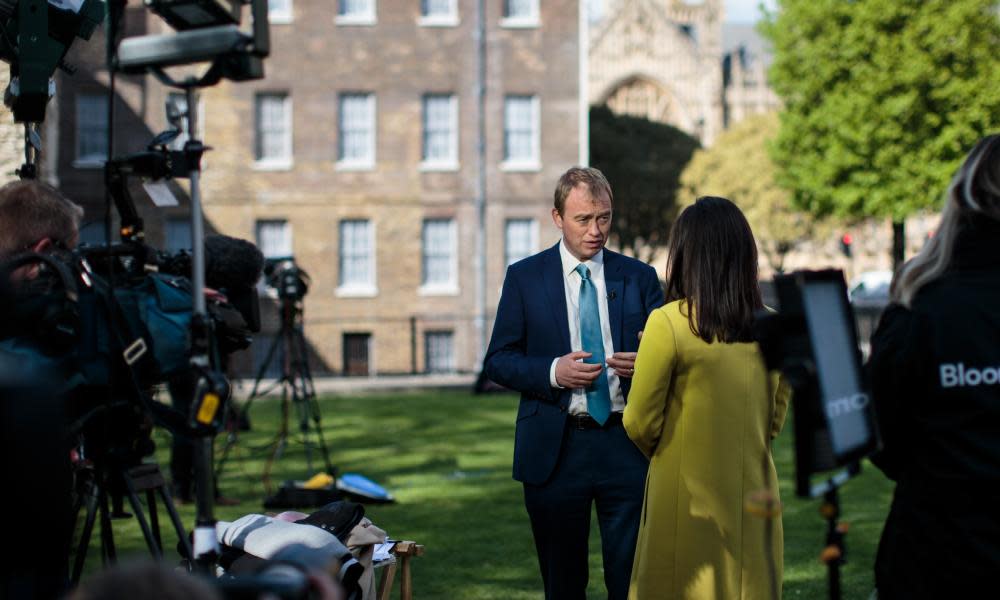Tim Farron says he doesn't believe being gay is a sin

Tim Farron has said he does not believe being gay is a sin and suggested he has been repeatedly asked about his views on the subject because he is a practising Christian.
The Liberal Democrat leader has been pressed to clarify his position on homosexuality in the last 24 hours because of an evasive answer he gave two years ago on whether he believed gay relationships were sinful.
Speaking to the Guardian after a morning of campaigning in Richmond Park, Farron said he had voted for equal marriage and was proud of his party’s record on LGBT rights.
He said the question of homosexuality and sin was “not a statement that I make, this is something I get asked because of my faith”.
Two years ago in response to a question on Channel 4 News, he responded: “We are all sinners.” The remark was raised again in an interview with Channel 4 News on Tuesday night, and in the Commons where, asked again whether he believed being gay was a sin, Farron replied: “No I do not.”
Asked whether he felt he was being pressed on the issue because of his Christianity, he said: “It may be, I don’t get to choose the questions people ask me. All I can do is be absolutely open about my belief in the fundamental equality of every human being, my passionate belief in fighting for equality where there isn’t equality.”
Describing himself as “a liberal to my fingertips”, Farron said his defining cause in life was “celebrating people’s right to be who they are, to love who they love, to marry who they marry”.
He said equal marriage legislation was progress but there was further work to be done. “It doesn’t include full equal marriage for people who are transgender and our fight for rights and freedom will continue,” he said.
“We should never be complacent about freedoms that have been hard fought for LGBT people, and for other minorities too, including religious minorities, protecting people’s rights to be who they are.”
Launching his party’s election campaign in south-west London alongside the Richmond Park MP Sarah Olney, who defeated the former Tory mayoral candidate Zac Goldsmith in a byelection in December, Farron was buoyant about his party’s chances of making more gains in Tory seats.
As activists gathered on Richmond Green, with Olney preparing to fight her second election in less than six months, a few miles away the coalition cabinet ministers Vince Cable and Ed Davey were preparing to stand again in their old south London seats. Both Twickenham and Kingston and Surbiton were won by Conservatives in the 2015 election when the Lib Dems were reduced to just eight MPs.
Farron has not ruled out another coalition with the Conservatives but said his real focus was making the Lib Dems a strong opposition party. “The issue is not about who might work with whom, it’s about whether she [Theresa May] can be defeated at all,” he said.
“It seems to me the Labour party is in a position where they are going to go backwards. I don’t think that’s an arrogant thing to say, I think it’s a reasonable assumption based on all the available evidence.”
He declined to put a number on how many seats the Lib Dems would consider a decent result, but said he was firstly targeting seats the party lost in 2015, as well as those that had high remain votes.
“Vauxhall; Esher and Walton, where there is an incredibly pro-leave MP [Conservative Dominic Raab],” he said. “Things have changed a lot, so I don’t actually know the limit of our ambitions. I don’t even have a number in my own head.”
The party also hopes to win seats back in Scotland from the SNP, including with former MP Jo Swinson, who has confirmed she will stand again in East Dunbartonshire. “I think there is a top chance of getting seats off the SNP. There are four, five, six seats where there are possibilities for us in Scotland,” he said.
Farron said increasing the number of female MPs was a priority for the party, with eight of its nine current MPs male and many of the big-name former cabinet ministers standing again also men.
“It’s the party’s policy to put women in the seats we think we can win, and because it’s a snap election obviously a lot of former MPs are standing again,” he said. “When we had a former incumbent who was male, that makes it a bit lop-sided, but we have many new women candidates including one in Sutton, and obviously Richmond Park.”
Health and social care will be the other key message for the party, but Brexit will take centre stage for every Lib Dem candidate in every seat. “Brexit has an impact on everything: if you are worried there are not enough carers, about the state of the hospital, that your school is not properly funded or there are too few police officers, then leaving the single market is a reason why that is the case,” he said.
His party’s health spokesman, Norman Lamb, has proposed that income tax should be increased by 1p to deliver a £4.6bn boost to the struggling NHS while a long-term funding solution is found, putting the party in the unusual position of promising tax rises going into an election campaign.
Farron said he thought his party should be honest about the need for more tax income to fund health and social care. “People don’t trust politicians at the best of times – nobody believes you can have a better NHS and social care without more money,” he said. “We have to be really clear that there is a way of getting more money if we as a community make a choice to invest in it together.”


